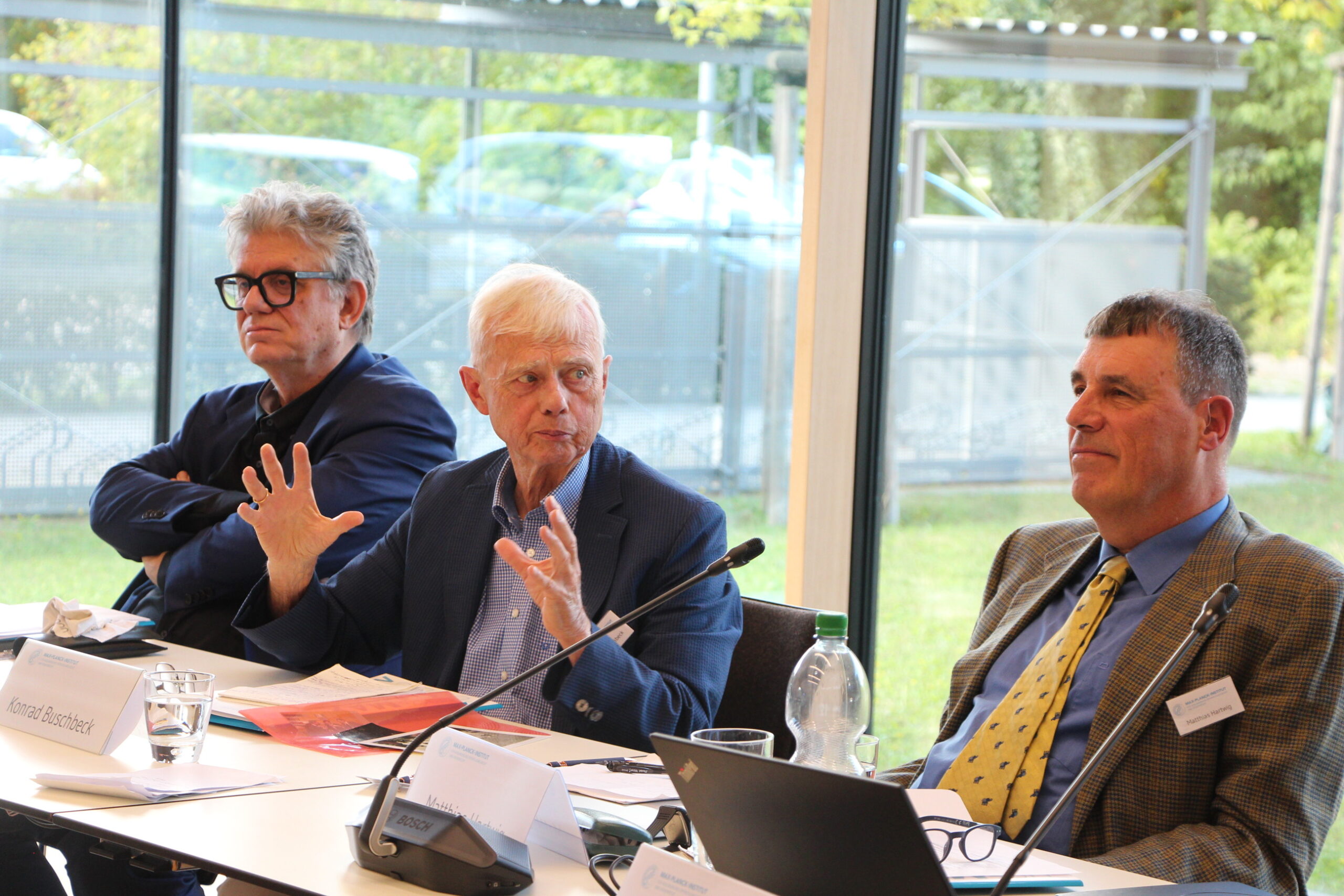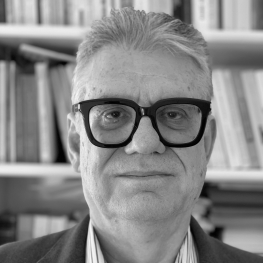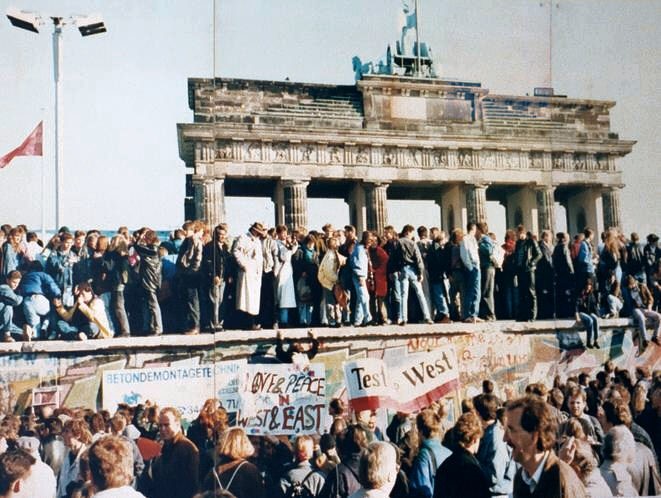I. Heidelberg, Summer of ‘89
With the exception of a brief three-day visit at the MPIL in 1983, my first ‘real’ research stay (of three months) took place in the summer of 1989, following my PhD in Frankfurt/Main and the completion of my twenty-three months-long military service in Greece. It was a great opportunity to be among ‘the best and the brightest’ junior scholars of my generation, ‘weltoffen’ and with a real passion for geopolitics and international law. The summer of ’89 offered me the unique possibility of discussing the things to come and of reflecting on the big picture of events and their interconnection; since then, I have become a regular guest at the Institute in summer times. My MPIL ‘career’ concluded with five years of stay in the period 2018-2023. This blogpost is about ‘impressions’ and ‘reflections’ linking thirty-five years of legal policy discourses with friends and colleagues at the Institute, 1989 to 2024, and has been conceptualized as contribution to the ongoing debates of the Institute.
For junior law scholars from Greece, Germany offered the natural space for their PhD research back then. There has been a foundational impact of German legislation and legal thinking in Greece, since the era of the first King of the new independent Greek State, Otto von Wittelsbach (1832-1862). This included the major contribution to the collection and codification of the Greek customary law by Georg Ludwig von Maurer, Professor of Law at the University of Munich, in his capacity as a member of Otto’s three-member Regency during the King’s minority.[1] Otto’s era was one of the first experiments in nation-building in European history. Despite its shortcomings, Otto’s reign succeeded in creating ‘Western-like’ political and legal institutions that prevented the country’s drift towards the Russian sphere of influence, as powerful domestic constituencies intended for.
In the 20th century, Ernst Forsthoff was appointed as President of the Constitutional Court of Cyprus and remained in office for three years (1960-1963). Despite critique from the German media, he resigned when he had to choose between loyalty to his function and submission to the politics of the Cypriot government. Another example of the economic-cultural impact of the German legislation in the Greek legal order: Greece incorporated and applied the Bierreinheitsgebot until the end of the 1980s, when the European Court of Justice decided that it contravened the principle of the free movement of goods.[2]
I did my PhD research at the University of Frankfurt/Main with the support of the DAAD in the first half of the 1980s and was awarded the Dr. jur. degree by said University. During that time and despite the prominence of the Habermas school of thought in Frankfurt, I was attracted to Luhmann’s systems theory and to the thinking of Carl Schmitt. These two intellectual traditions appear prima facie as incompatible, but they are not; in combination, they build the theoretical background for understanding the Neo-Hobbesian world society of the 21st century. Later, I had the opportunity to engage with Gunther Teubner’s grand theory and I am grateful to him for the long discussions we had, for his guidance and for his kindness.
Returning to the Institute: Like most of the guests, I regularly attended the Referentenbesprechung in the summer of 1989, but preferred to keep my thoughts private during the official meetings. The particularly German legal discourse, the impressive knowledge of the technical minutiae of international law and comparative law exhibited by the researchers of the Institute and the strict discipline of the events were clear deterrents for an active participation of outsiders.
The picture changed in the informal discussions, which offered us the opportunity to engage with the broader geopolitical and philosophical dimensions of a disintegrating international system. The internal dynamics of our private exchanges during common lunches, and at evening meetings in our cultural centre – the always welcoming home of Matthias Hartwig – proved to be the best pathway for exploring the ongoing developments and for re-imagining a world that we had not expected to be able to change so suddenly and so dramatically.
These discussions, tough and adversarial, were a fascinating demonstration of rational discourse, clash of ideas, and deep friendship and respect for each other. During my stays in Heidelberg in 1989 and later, I cannot recall any meeting that ended in consensus. Disagreement was the motor of learning. Friendships built at that time are still alive and strong, supported by the feeling that we have lived through these extraordinary times, among the most important of European modernity. The hopes and visions of that time were soon replaced, however, by gloom, as the war in Yugoslavia raged through the 1990s.
Here, I will briefly assess the events of 1989 from a contemporary vantage point and draw some lessons for the future of research. I will discuss two themes of interest to the Institute, namely, the spatial restructuring in Eurasia and in world society after the collapse of communism (II.) and the capacity of the ‘South’ to substantially challenge the shape of international law and international relations after the end of the Cold War (III.), before making some research policy suggestions (IV.).
II. The Eurasian Space. Grossraum and the Totality of Space
1989 was not a moment of a social or a political revolution leading to a ‘common European home’,[3] as I believed back then, but foremost a Raumrevolution, a spatial revolution, establishing the conditions for a novel Raumordnung, an ‘order of the space’. We should distinguish here between the regional Eurasian Raumordnung and the Raumordnung of world society.[4] These concepts should obviously be disconnected from their original context in the system of Carl Schmitt, in order to become functional for the analysis of international law and geopolitics in our time.
1. The territorial rearrangements in Europe and Eurasia, symbolically and spatially best represented by the Fall of the Berlin Wall, turned out to be more complex than we imagined in 1989. The Soviet Union disappeared, but was followed by the emergence of Russia’s Grossraum, built on questionable legal bases. In the Minsk and Alma Ata agreements of December 1991, the right of self-determination of the successor States was undercut by the creation of a so-called ‘common security space’. No State can withdraw from the Grossraum unpunished, as Georgia (2008) and Ukraine (2014, 2022) have experienced. More recently, signals by Armenia for closer ties with the West were met with intimidating noises from Russia. Furthermore, Russia’s long-term objective has been to subvert the European and possibly the global geopolitical order by compulsion and force, if necessary, as can be inferred from the two draft treaties with the United States and NATO, proposed on 17 December 2021 and confirmed by Russia before the ICJ during the oral proceedings on the preliminary objections of the Allegations of Genocide case (Ukraine v Russian Federation).
2. The dissolution of the USSR brought not only the Eurasian Grossraum into life, but it completed the formation of world society.[5] The Raumrevolution of 1989 created what I call ‘the totality of space’. One Earth, a totality of one space with territorial, social and virtual dimensions and with limitless possibilities for expansion, fragmentation, and domination: this is a relatively realistic description of world society. At the Institute, this reality has signalled a shift from the German-centric towards a more globalised approach. In world society, this is the expected normality and does not need to become a political project. In research, merit should be the most important criterion, enabling selections from the broadest possible pool of qualified candidates from all over the world. Diversity of opinion is at the core of the constitution of science.
III. On the North/South Distinction

The author (left) with Konrad Buschbeck and Matthias Hartwig, during the seminar series “100 Years of Public Law” at the Institute, 2024[6]
The epoché of ’89 has created, over time, a shift of scholarship towards multiple directions. As research depends on the form of world society, it became imperative to think about the alleged North/South distinction.
Ideas and projects that describe the world in terms of a segmentary differentiation are necessarily overly simplistic. I argue that what is called ‘the South’ is not founded on a deeper community of values and has not reached, as a whole, any meaningful degree of economic or sociological integration. The East-West distinction is still prevalent, but in a very different form compared to the Cold War.
The process of decolonisation was legally cemented via normative UN Resolutions and jurisprudence before the end of the Cold War. Common political strategies were originally devised by the Newly Independent States and the Eastern Block. However, the Non-Aligned Movement was weak, as the appeal of Indian Prime Minister Pandit Nehru to President Kennedy for a US intervention during the 1962 war with China shows.[7] The old historical antagonism between the two most populous countries of the world, India and China, still obstructs the effectiveness of what is called ‘the South’ and its institutional expressions, such as the BRICS and the Shanghai Cooperation Organization. The divergence of the geopolitical orientations of the two counties has a long pedigree. In the area of law this was also expressed during the early post-World War II period in the opposite sides taken during the Tokyo trial of Japanese war criminals by the Indian judge Radhabinod Pal and the Chinese judge Mei Ruao.[8] In our summer discussions of 1989, China’s role had escaped our attention, despite Tienanmen. The rise of an authoritarian nationalist great power in Asia was not within our conceptual horizon.
The disappearance of the Soviet Block and the USSR restricted the influence of the Non-Aligned Movement in international affairs. In the current new ‘great game’ in Africa, democracy is the first victim of Russian expansionism.[9] The debates on ‘decolonisation’ are Western-centric in the sense that they mirror the increasing identity splits and conflicts in the West (‘decolonize the curriculum’). These debates and narratives have only limited significance for international law and the sociological basis of international relations.
For instance, despite the ongoing debates, international law has not yet recognised an obligation of reparations for slavery. Should that happen, unsettling questions would emerge. What about Dahomey (now: Benin), a powerful African military monarchy, whose wealth and power in the 18th and 19th centuries relied on slave trade with European powers, as accurately described by Karl Polanyi?[10] Should Benin pay reparations for slavery under the principle enunciated in Art. 16 of the ILC Articles on Responsibility of States for Internationally Wrongful Acts?[11] And who else would be called upon to pay reparations, considering the global dimensions of slavery?[12]
Perhaps the most important jurisprudential act relating to decolonisation has been the ICJ judgment in the case Burkina Faso v Mali. This judgment was rendered in 1986, the same year as the Nicaragua judgment, and these judgments constitute the culmination of the Court’s activity during the Cold War. The Burkina Faso v Mali judgment clarified the most important question relating to the principles of self-determination, namely whether ‘the people’ in the national and ethnic sense determine the territory, or vice-versa. The ICJ decided that the territory constitutes a self-determination unit via the principle of uti possidetis and therefore territorial space determines the people in the legal sense. Thus, it recognized the primacy of the territory over population and ethnicity for the sake of effective governance.
This judgment rejected parochialism, tribalism and clan politics and established the link between self-determination and the idea of cosmopolitan territorial governance. The Chagos and the Palestine advisory opinions followed a similar rationale. In Chagos, the removal of the entire population half a century ago did not prevent the Court from recognizing the right of self-determination based on the territory; in the Palestine advisory opinion the ICJ stressed that the Occupied Palestinian Territory (OPT) is a single territorial unit, despite the existence of two separate segments, hostile to each other (Gaza, West Bank).
It is difficult to discover major legal/institutional innovations in the post-Cold War era relating to ‘postcolonialism’, whatever the concept might mean. The ‘South’ is not a ‘community of values and interests’, the main reason being that developing States usually follow transactional policies among themselves and with great powers, even at the expense of their own institutions. For instance, the dictatorships in Burkina Faso, Mali and Niger, that enjoy the support of Russia, withdrew from ECOWAS, which has been one of the most important regional agencies for the preservation of peace in Western Africa with immediate effect on 28. January 2024. These dictatorships did not hesitate to impair an organisation that has represented the common bonds among West African States.[13]
I cannot discuss the question of Palestine in detail here. Anyway, if we accept the ‘colonial’ character of the Israeli occupation, we may also better understand the position of East European and Ukrainian scholars regarding the colonial nature of the Russian State.[14] This approach suggests that the Russian aggression is a war of (re-)colonisation. One may wonder whether the West, by supporting Ukraine, is fighting an anticolonial war against Russia which would then, in such an understanding, occupy the notional place of the North.
There are two ‘postcolonial’ ICJ cases of significance. The case Equatorial Guinea v France deconstructs the North/South distinction. Criminal proceedings against Equatorial Guinea’s Vice President and the son of the country’s President, initiated by Transparency International in France, and the ICJ judgments that followed, exposed the deep corruption of the Southern elites that cause massive poverty and misery in the population, and showed how France attempts to secure and preserve the public property of the Guinean people. The question arises whether the abusive elite of Equatorial Guinea has any legitimacy to claim itself as a victim, and to complain about alleged injustices. Are other countries, such as authoritarian Zimbabwe and oil-rich Angola, also ‘victims’ of the structures of the international system, of their own rulers, or of both?
In the Guyana v Venezuela case on the sovereignty over the Esequibo region, Venezuela uses a postcolonial argument, namely that its claimed loss of the area to Guyana, a former British colony, was due to an allegedly corrupt arbitration award of 1899, engineered by the British. The case is still pending and the Court’s judgment on the merits could constitute an important moment for Latin American States and for the assumptions of postcolonial approaches.
IV. The Path to the 21st Century

The Institute in 2019[15]
Having been in West Germany for my PhD in the first half of the 80s, I have a very good recollection of the worries and anxieties of nuclear war that dominated in the West at that time, as the impact of the 1983 ABC movie ‘The Day After’ in the United States also shows.[16] In retrospect, the peaceful disintegration of the USSR and the German unification have been nothing short of miraculous. This was the great achievement of the then leadership of the West and of the Soviet Union. I stayed in Warsaw for two months in the period 1980/1981 and I observed the birth and rise of Solidarnosc. In a unique historical moment that triggered the changes of 1989, a group of workers from Gdansk, the proletarians of the communist experiment, were able to reimagine the world in a way that the academics and intellectuals in the West had arrogantly rejected, trapped in the group thinking of the various strands of Marxist thought.
During the Cold War, Western intellectuals devoted a huge amount of societal resources to conducting ideologically prejudiced research on the transition from capitalism to socialism, but failed to think about the real issue, namely the transition from socialism to capitalism. It would be highly instructive to compare the number of books and monographs written on each of the two themes.
In stark contrast, the Institute showed its sense of historical responsibility during the Cold War and later during the 1990s and fulfilled its mission by being aware of the geopolitical context and by conceptualizing international law accordingly. Jochen Frowein’s habilitation on the ‘de facto’ regime in international law is a great example of this research tradition.[17]
We live in an era in which the capacity of the West to safeguard international peace and security has significantly diminished. The 21st century is now in full swing and a radical transformation of national and international institutions of governance will be necessary in the next decades. This will not happen through wishful thinking and civil society activism, but through a revolution in systems governance. Natural law thinking generally offers no meaningful solutions to contemporary society. Instead, it is preferable to optimize the technological and scientific capabilities of the new era for the purposes of global and systems governance. Moreover, international law should be taught and studied together with geopolitics and international relations theory. Research should shed more light on the ‘blind spots’ of the mainstream and be critical of what is considered to be ‘obvious’.
The preservation of peace in our time requires consideration of six principles as guidelines for action and research, not only in the Institute, but more broadly in the academic communities of democratic States:
i. Security First: Awareness of the real and concrete security risks facing the world and the will to confront them;
ii. Consideration of ‘good science’ through rigorous methodology as the basis for rational decision-making;
iii. Acceleration of technological development instead of its blocking;
iv. Fight against poverty in developed and developing States and societies;
v. Orientation of jurisprudence to the international common interest/common good and distancing from the ‘society of singularities’ and lifestyles; and
vi. Good, effective and progressive systems governance in ordered liberty
Thus, instead of thinking in terms of segmentary differentiations of all sorts, we should think in the broader context of a single global space being in the process of continuous fragmentation, reintegration and rearrangement. This would enable policymakers to make informed decisions and select among alternatives, but requires unconventional thinking, detection of ‘blind spots’ and critique of routines.
Heidelberg and the MPIL offer scholars from all over the world great opportunities for research and reflection. As a lucky guest of the late 1980s, I would propose Streitgespräche about the antagonistic normative projects and alternative futures of the Neo-Hobbesian 21st century: Gaia (Mother-Earth) or Cosmos, back to nature or forward to the stars.
***
[1] See: Georg Ludwig von Maurer, Das Griechische Volk in öffentlicher, kirchlicher und privatrechtlicher Beziehung vor und nach dem Freiheitskampf bis zum 31. Juli 1834, Heidelberg: Mohr 1835.
[2] ECJ, Judgement of 12 March 1987, case no. 176/84, ECLI:EU:C:1987:126 – Commission of the European Communities v Hellenic Republic; Judgement of 12 March 1987, case no. 178/84, ECLI: ECLI:EU:C:1987:126 – Commission v Federal Republic of Germany; Achilles Skordas, Das griechische Bierreinheitsgebot und die erforderliche Reform des Lebensmittelrechts, Recht der Internationalen Wirtschaft 1992, 977-982.
[3] The concept was coined by Michail Gorbatschow, Erinnerungen, Siedler Verlag, Berlin, 1995, at pp. 631 ff.
[4] For these concepts and their operationalisation, see: Carl Schmitt, Der Nomos der Erde im Völkerrecht des Jus Publicum Europaeum, Berlin: Duncker und Humblot 1988 [1950]; Carl Schmitt, Staatliche Souveränität und freies Meer – Über den Gegensatz von Land und See im Völkerrecht der Neuzeit (1941), in: Günter Maschke (ed.), Carl Schmitt. Staat, Großraum, Nomos – Arbeiten aus den Jahren 1916-1969, Berlin: Duncker und Humblot 1995, 401-430 (405); Carl Schmitt, Die Raumrevolution – Durch den totalen Krieg zu einem totalen Frieden (1940), in: Maschke, Carl Schmitt. Staat, Großraum, Nomos, 388-394.
[5] On world society, see: Niklas Luhmann, Die Weltgesellschaft, Archiv für Rechts- und Sozialphilosophie 57 (1971), 1-35.
[6] Photo: MPIL
[7] Odd Arne Westad, The Cold War – A World History, New York: Basic Books 2017, 436-437.
[8] Gary Bass, Judgment at Tokyo – World War II on Trial and the Making of Modern Asia, London: Pan Macmillan 2023.
[9] See: UN, Report of the Secretary-General, Activities of the United Nations Office for West Africa and the Sahel, 1 July 2024, S/2024/521.
[10] Karl Polanyi, Dahomey and the Slave Trade – An Analysis of an Archaic Economy, Seattle: University of Washington Press 1966, in particular: 99 ff.
[11] UN, GA Resolution 56/83, 28 January 2002, A/RES/56/83, Annex.
[12] See: Egon Flaig, Weltgeschichte der Sklaverei, 2. ed., Munich: C.H. Beck 2011; see also: Y Hakan Erdem, Slavery in the Ottoman Empire and its Demise, 1800-1909, New York: St. Martin’s Press INC. 1996.
[13] UN, Report of the Secretary-General (Fn. 9).
[14] See, already: Włodzimierz Baczkowski, Russian Colonialism: the Czarist and Soviet Empires, in: Robert Strausz- Hupé/Harry Hazard (eds), The Idea of Colonialism, New York: Frederick A. Praeger 1958, 70-113.
[15] Photo: MPIL.
[16] Stanley Feldman/Lee Sigelman, The Political Impact of Prime-Time Television: ‘The Day After’, The Journal of Politics 47 (1985), 556-578.
[17] Jochen Abr. Frowein, Das de facto-Regime im Völkerrecht: Eine Untersuchung zur Rechtsstellung “nichtanerkannter Staaten” und ähnlicher Gebilde, Köln: Carl Heymanns Verlag 1968.

Achilles Skordas is a Senior Research Affiliate at the MPIL.

